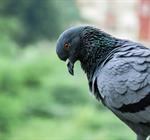29 Oct 2021 | Apex Environmental Services (UK) Ltd
Birds may not seem as obvious a pest as others, but they can cause significant harm to you and your home. While some birds are useful to homeowners by eating nearby insects or entertaining you as they splash in a birdbath, an infestation can damage building structures.
Bird-related problems are actually one of the most common pest issues reported and the ever-increasing population of birds doesn't help. New figures from the Avian Population Estimates Panel (APEP) suggest that there are 83 million pairs of native breeding birds rapidly multiplying in number in the UK.
Continue reading to learn more about the damages you risk as a homeowner.
Bird Related Damage at Home
Fouling
Unsightly droppings can build up and foul nearby paved areas increasing the slip and fall risk for members of the house and even neighbours. Birds also foul vehicles parked around their breeding areas. Bird droppings are not only drab, they also lead to fetid odours around the home.
Clogged Gutters
Birds usually build nests in high places like trees or the roof. Gutters are especially attractive to birds because they often have easy access to fresh water. Stagnant water is also a breeding ground for insects, thus a source of food for the birds. Nests on gutters can block water flow and lead to flooding. The extra weight makes the gutter system sag and can damage walls and siding.
Acid on Roofs
Bird droppings are highly acidic. Droppings on your roof can decompose roof tar, allowing moisture to seep inside the house. You may have worked very hard to make your home beautiful, but birds can destroy all that.
Physical Damage
Larger birds such as pigeons can dislodge roof tiles. Bird droppings also corrode stone, metal, paintwork and other building materials. The damage can result in a high cost of repairs for homeowners.
Chimney Blockage
Some birds make nests in hollow trees, and a chimney is a viable alternative. Blocking a chimney causes smoke and carbon monoxide to back up into your home. Nests are also made of flammable materials, making them potential fire hazards if a stray spark reaches one.
Damage to Roof Spaces and Insulation
If a nest is built in your roof vent, it will block proper airflow to the attic. This leads to a buildup of moisture on the upper floor, causing support beams to rot and encouraging mould growth. Likewise, birds gaining access to roof spaces can severely damage insulation. Again, the extent of this damage means very costly repairs.
Blocked drainage systems and water damage
Nests block drain pipes leading to flooding on the roof, which can then become breeding sites for flying and biting insects. The flooding can cause internal leaks, rotten timbers, metal corrosion, damaged plaster and other wall coverings and flooring inside the building. This indirect damage makes a house look worn.
Consumption of Stored Food
At home, birds can cause damage to grains, flour, and their foodstuffs. Birds can gain access to stores and kitchens through doors, ventilation points, damaged roofs or even open windows. Even packaged goods can be damaged by birds by pecking at them to access the food or from droppings fouling the packaging.
Damage to Home Decor
Sometimes homeowners leave windows open to let some fresh air in, not considering the risk they are exposing the interior to. If birds are allowed access to rooms in the house, the damage they can cause is incomprehensible.
They can leave ugly droppings on furniture and window sills, destroy decorations like flowers and even break fragile objects as they fly around the house.
How To Deter Birds From Damaging Your Home
Having fathomed the damage that birds are likely to cause around the home, it is only fair to cite some remedies to the problem. Below are some tips that will help you get rid of these rather stubborn avian friends.
Adjust Your Home Environment
Over the years some tactics have proven effective against birds. These tactics keep away birds without harming them in any way. It will be worth the time to try the following tactics;
Use Scare Tactics - Birds will not nest around a place where there is a fear of predation. Installing fake predators like plastic owls or coyotes will prevent birds from nesting around your home.
Noise Deters Birds - A noisy environment doesn’t favour birds. It makes them feel uncomfortable. Installing noisy machines at home deters birds. However, before you decide to install noisy machines around your home, make sure your neighbours are okay with it and set it low enough so as not to disturb them.
Physical barriers - One of the easiest ways to keep birds from building a nest on your roof or ledges is to install a physical barrier. The most common physical bird barriers available today are bird netting, bird wires, and bird spikes. These create an uneven roosting place for birds, thus keeping them away.
Reflective lawn decorations - To keep birds from roosting in your perches, hang reflective bird diverters. As these diverters move and sway, birds should be scared, keeping them away from your porch.
Consult Pest Management Professionals
Now, if you think you have done everything you can to keep birds from making a nest in your home, but they insist on building a nest, just be responsible. Never use poisons or sticky gels. These methods are inhumane and will only result in injuries and you may find yourself in trouble for your actions.
In most countries, Birds are protected by wildlife laws and can only be disturbed or killed in certain circumstances or seasons. In the UK, the Royal Society for the Protection of Birds( RSPB) has set strict laws with heavy penalties for people who disrupt birds' natural habitats.
It is important to identify a bird you consider to be a pest before taking any action to control it and check the local wildlife laws. Your best option is to check with a professional pest controller.
Work With the Professionals
Apex are experts in pest bird control and work hard to provide businesses and homeowners with the most cost-effective solutions to their problems.
Additionally, all work undertaken by Apex is strictly in line with the Wildlife & Countryside Act 1981, which aims to conserve wild birds and preserve air safety.
For a no-obligation chat, contact our team today on 01256 578025 or email us at info@apexbirdcontrol.uk.


